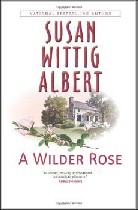 Susan Wittig Albert •
Susan Wittig Albert •
A Wilder Rose •
Rose Wilder Lane is already a successful writer when she returns to Rocky Ridge in 1928 to help her aging parents around their Missouri farm. The “help” ranges from financial subsidies to the building of a new house with electricity and running water. Her task is made harder by the well-known propensity of tough Midwesterners to refuse assistance.
Lane’s mother, Laura Ingalls Wilder, attempts an autobiography but finds no publisher for it. At Lane’s urging, “Mama Bess” reworks parts of the material for a younger audience.
Little House scholars have long speculated about the gap between the somewhat flat handwritten drafts in Wilder’s dime-store notebooks and the polished writing of the final versions. Albert supplies a credible theory—that Lane acted as editor, ghostwriter, and agent—and backs it with a masterful portrait of the complex relationship between the two women.
Lane draws on her literary expertise to contribute plot, character development, structure, and dialogue to her mother’s manuscripts, and on her publishing connections to see that all eight books reach print. In the years it takes to accomplish this feat, she struggles between love for and loyalty to her parents, and her restless wanderlust and need for intellectual stimulation. Her closest companions are the terrier Mr. Bunting and her dear friend “Troub” (Helen Boylston, author of the Sue Barton books), with whom she shared a life in Albania.
A Wilder Rose is nominally fiction, but fiction in the Little House tradition, with real-life incidents taken from diaries and letters, embellished and shaped into a narrative. You come away with a deeper appreciation for both women’s gifts and the unusual partnership behind this classic series. Whether or not you accept Albert’s premise, the story is certain to captivate you.







Your email address will not be published.